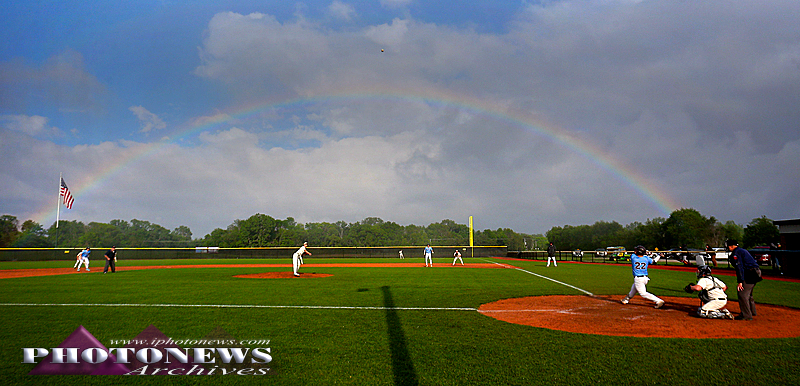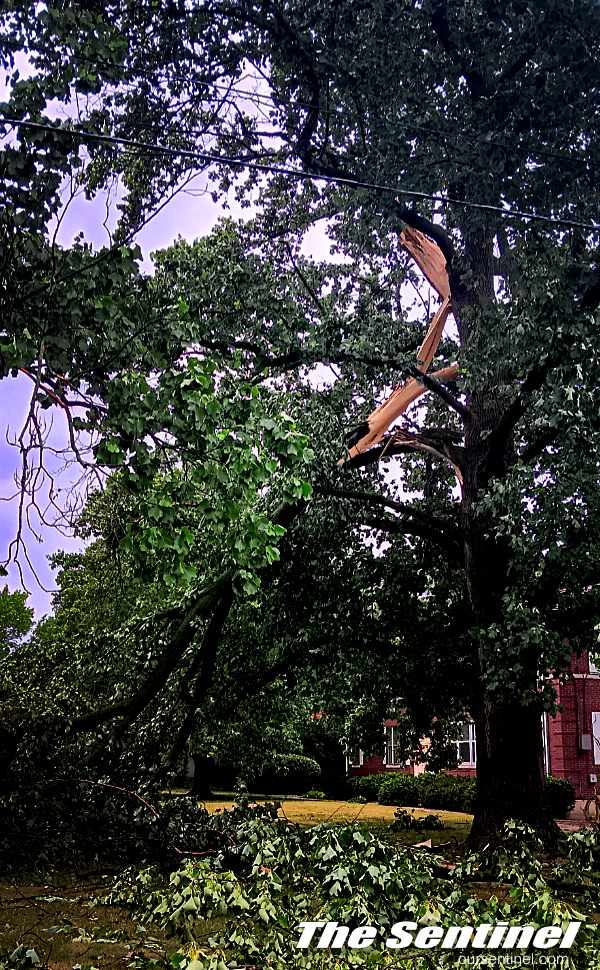
The simplest approach to winterizing your gear for playing outdoors in cooler temperatures is changing to a different string and playing with lower string tension.
Photo: Chino Rocha/Unsplash
Urbana - This winter, climatologists predicted an El Niño weather pattern for the Midwest. Usually means above-average temperatures and dryer, below-normal precipitation. The weather the last four days in Champaign-Urbana has turned cooler, wetter, and even windier than anticipated. Fortunately, daytime highs are supposed to return to the 50s and low 60s by this weekend, which is good news for many tennis players in Champaign-Urbana.

According to weather experts, winter shouldn't look this in Champaign-Urbana this season.
Photo: Jonas Vandermeiren/Unsplash
Reserving indoor court time at
Atkins Tennis Center or the park district's
Dodds Tennis Center after work or a day of classes can be nearly impossible some evenings and on the weekends. A milder winter season means tennis players can play outdoors and avoid the hassle of scheduling indoor court time and the associated costs.
Playing tennis when the temperatures dip below the 50º mark is not nearly as bad as you might think. Once you start focusing on hitting the ball and winning points, and your body temperature rises from the exercise it loves, you will forget about being cold.
Here are a few tips for playing cold-weather tennis:
1. Level up to playing outdoors by layering up.
A long-sleeve dry-fit top, a t-shirt, and medium weight sweatshirt will probably keep the upper part of your body sufficiently warm when the air temperature is in the mid to upper 40s while playing. You can add or remove layers as suit your personal comfort needs. Shorts, coupled with either running pants or traditional sweatpants, should keep you warm enough for singles play. Add another layer by wearing
Dry-Fit leggings under sweats or joggers.
Don't forget to wear a hat. We lose 50% of our body heat from our head and neck region. Neck gaitors can be pretty effective in keeping your body feeling warm on a chilly day, too.
2. Adjust your grip
When the temperature dips below the mid-40s (and for some of us below the mid-50s), you'll probably want to wear gloves. If you plan to play outdoors regularly in cooler temperatures, consider buying a second or third racquet and set it up - more on that later - exclusively for outdoor use. Depending on the gloves' thickness, consider removing the overgrip and/or grip so you can feel edge of the bevels on your racquet's handle. This will also keep you from having to grip the racquet tighter in order to maintain control of it.
Between points and on changeovers, keep your hands warm by sticking your hands in your pockets. Tennis tends to be just as much a social activity as competitive. Warm up those fingers while chatting up you opponent or doubles partner.
Another hack, this one
borrowed from the NFL players who play in extremely-cold temperatures, is to rub hands and exposed skin with vaseline or a product called
Warm Skin.
"The idea [is] that it closes the pores a little bit and gives you a little bit more protection from the elements," is what Dr. Samuel Taylor, sports medicine surgeon at the Hospital for Special Surgery and associate team physician for the New York Giants,
told AccuWeather reporter Ashley Williams.
3. String it up right
Ambient temperatures affects the rubber in balls, racquet stiffness, and the way strings feel when hitting the ball. As the temperature drops, the rubber on the tennis balls and plastic strings become stiffer, resulting in a boardy feel on impact. Playing with old balls and polyester strings with tensions in 50s or higher in 40º temperatures might feel more like baseball or cricket.
For a competitive outdoor match, start with a can of new balls for a better bounce. Extra heavy duty balls are an absolute must below 50º or so, regardless of the court surface, if your rely on kick serves to start your points.
Depending on the frame and its composition, your racquet feedback - the way the ball feels and the shock transmitted on impact with the ball - may feel almost foriegn. The loss in flexibility may translate to a loss of power and pace with some strokes. Players who need more power from their sticks can add more mass in the form of
lead tape, starting conservatively at first, to increase the depth and penetration on their shots.

Illustration by Charly Gutmann/Pixabay
The simplest approach to winterizing your gear is changing to a different string and lower tensions.
Depending your style and level of play, you will want to have your stringer drop your string tension. Soft strings like natural gut, synthetic gut, and multifilament string don't require a huge drop in tension, maybe three to six pounds. Gut and multis strings are not as sensitive to temperature as their poly cousins.
Because of their inherit stiffness, drop polyester and co-poly string tensions by 10% as a starting point to maintain a somewhat familiar level of performance as a starting point for outdoor play when the thermometer dips below 60º or so, and go another 5% for every 10º below that. Individual mileage will vary depending on the string you are using. Ultimately, you will have to find a tension that works well with your style of play when playing in colder temperatures.
One caveat: Poly strings go "dead" - lose their elasticity - faster in colder temperatures, which sucks because most recreational players use poly for durability. Playing with stiffer balls and a firmer string bed can possibly lead to injury. Plan to string more often, maybe after every 10-15 hours of play to avoid wrist, elbow, or shoulder issues.
Otherwise, until temperatures migrate back toward the mid-60s, skip using polys for a few months so you can enjoy the game outdoor. For a softer, more responsive string bed, switch to a multifilament string like Tru Pro Triump, Wilson Sensation, or Technifiber's TGV. There are dozens of low-cost multis on the market that won't hurt your wallet or your arm.
4. Stay hydrated
A common misconception is you don't need to drink much water when it is cold out. That is further from the truth. Because cooler air is dryer, you won't notice the sweat as much and may not think you need to drink water. In reality, thanks to faster evaporation, additional layers of clothing, and increased water loss from breathing, you still need to plenty of fluids and electrolytes.

Playing tennis in colder temperatures can help improve your overall game by giving you the opportunity to improve your game by playing tougher shots like drop shots and low-bouncing balls that skid across the court when it is colder. Winter tennis is a great way to improve footwork and anticipation skills for the next warm-weather season.
Image by Lars/Pixabay
Chapped lips, lower endurance when playing long points, and mental fatigue are sure signs you need a sip or two of water during changeovers.
Better yet, take one out of the NFL playbook and bring a thermos of warm chicken broth or hot chocolate for hydration and warming up the body.
Veteran tip: If you are playing when the air temperature is at or below freezing, bring a wide-mouthed bottle to the court with you and set it upside down so ice will form at the bottom of the bottle and allow you to flip it over and drink. The insulated water bottles and jugs you used all summer will work well, too.
5. Change up your style of play
A lot of tennis players don't like cold-weather tennis because it is more physically challenging. Toward the end of October in central Illinois, the sun is lower on the south horizon, and there is always a light to steady breeze out of the northwest, making it more challenging to serve and track the ball during rallies.
The cooler ambient air drops the air pressure inside balls and makes the rubber under the fuzz harder, making the ball bounce lower than usual. Strong players capable of grinding from the baseline for seemingly hours and use heavy topspin to push opponents back tend not to enjoy chasing low balls and skidders inside the service line.
Net play coupled with drop shots, slices, and flat serves are the key to playing winning cold-weather tennis.
Related articles:

CU is a great place for tennis; 5 really good reasons why you want play, too
If you love tennis, then Champaign-Urbana is a great community to live in. With over 120 courts available, two well-maintained indoor facilities, and plenty of options for lessons and instruction, tennis is a fun sport for all ages to stay physically active, mentally sharp, and compete as a recreational player anywhere from a local level all the to way various national championships.

Tigers tennis duos set to face first-round opponents today
There's nothing like competing against the best athletes in the state. Urbana's #1 and #2 doubles pairs will put their training and mental stamina put to the test when they take the court in Day 1 competition at the Illinois High School Association's Girls Tennis State Final.
Tigers Alisa Tangmunarunkit and Luna Morales play their opening match against...
 by Judith Ruiz-Branch
by Judith Ruiz-Branch



























 CHICAGO -- Forecasters are predicting another season of cold, wet weather for Illinois and the upper Midwest this winter, which could bring some high energy bills.
The National Weather Service, the National Oceanic Atmospheric Administration, and the Old Farmer's Almanac are all calling for a snowier-than-usual season, with major storms possible in January and February.
Illinoisans are being advised to take steps now to make their homes and businesses more energy-efficient.
Whitney Hayes, research analyst for the nonprofit advocacy group Elevate, said folks who heat with gas should prepare to dig deep into their wallets.
"There's a couple of things going on with gas prices, one of which is the cost of gas itself," Hayes pointed out. "And so, that does fluctuate depending on the market and depending on what's going on in the world. I mean, gas prices globally are up, it's not just the U.S."
The nonprofit Citizens Utility Board said natural gas prices have doubled or tripled in the past two years, and gas futures just hit a 14-year high. Analysts estimate for November through March, natural gas customers can expect to pay between $1,200 and $1,400 to heat their homes.
Hayes pointed out homeowners could save a significant amount on their energy bills and cut greenhouse gas emissions by switching to electric appliances. While it is not something everyone can afford, she stressed making even minor changes can cut costs.
"Even small things like making sure that there's air sealing around windows and doors, electrical sockets," Hayes outlined. "Even those things can add up when you kind of seal it in -- almost 10% of energy savings -- by doing those small little things."
Hayes added higher gas bills are often a result of regulators allowing utilities to pass along cost increases they incur in what they pay for gas, and the cost of maintaining and expanding the equipment they use to deliver it. She explained both can increase a ratepayer's bottom line.
"In the U.S., and especially in the Illinois-Chicago area, there's a lot of infrastructure costs that people are paying for," Hayes noted. "Gas companies have made all these plans to improve the infrastructure, so that gets funneled down into people's bills."
CHICAGO -- Forecasters are predicting another season of cold, wet weather for Illinois and the upper Midwest this winter, which could bring some high energy bills.
The National Weather Service, the National Oceanic Atmospheric Administration, and the Old Farmer's Almanac are all calling for a snowier-than-usual season, with major storms possible in January and February.
Illinoisans are being advised to take steps now to make their homes and businesses more energy-efficient.
Whitney Hayes, research analyst for the nonprofit advocacy group Elevate, said folks who heat with gas should prepare to dig deep into their wallets.
"There's a couple of things going on with gas prices, one of which is the cost of gas itself," Hayes pointed out. "And so, that does fluctuate depending on the market and depending on what's going on in the world. I mean, gas prices globally are up, it's not just the U.S."
The nonprofit Citizens Utility Board said natural gas prices have doubled or tripled in the past two years, and gas futures just hit a 14-year high. Analysts estimate for November through March, natural gas customers can expect to pay between $1,200 and $1,400 to heat their homes.
Hayes pointed out homeowners could save a significant amount on their energy bills and cut greenhouse gas emissions by switching to electric appliances. While it is not something everyone can afford, she stressed making even minor changes can cut costs.
"Even small things like making sure that there's air sealing around windows and doors, electrical sockets," Hayes outlined. "Even those things can add up when you kind of seal it in -- almost 10% of energy savings -- by doing those small little things."
Hayes added higher gas bills are often a result of regulators allowing utilities to pass along cost increases they incur in what they pay for gas, and the cost of maintaining and expanding the equipment they use to deliver it. She explained both can increase a ratepayer's bottom line.
"In the U.S., and especially in the Illinois-Chicago area, there's a lot of infrastructure costs that people are paying for," Hayes noted. "Gas companies have made all these plans to improve the infrastructure, so that gets funneled down into people's bills."












